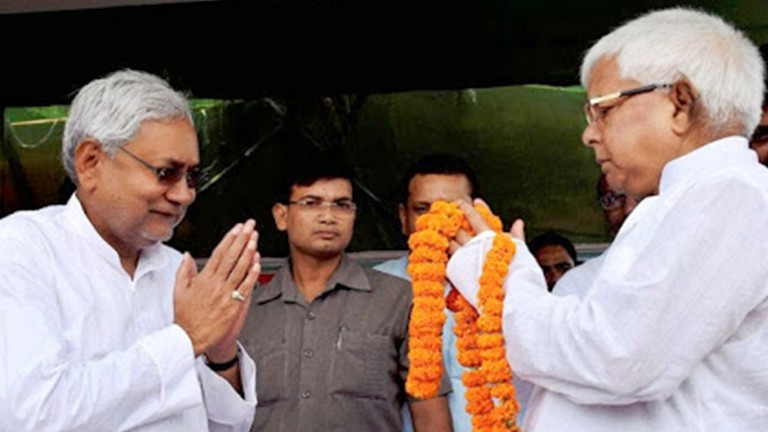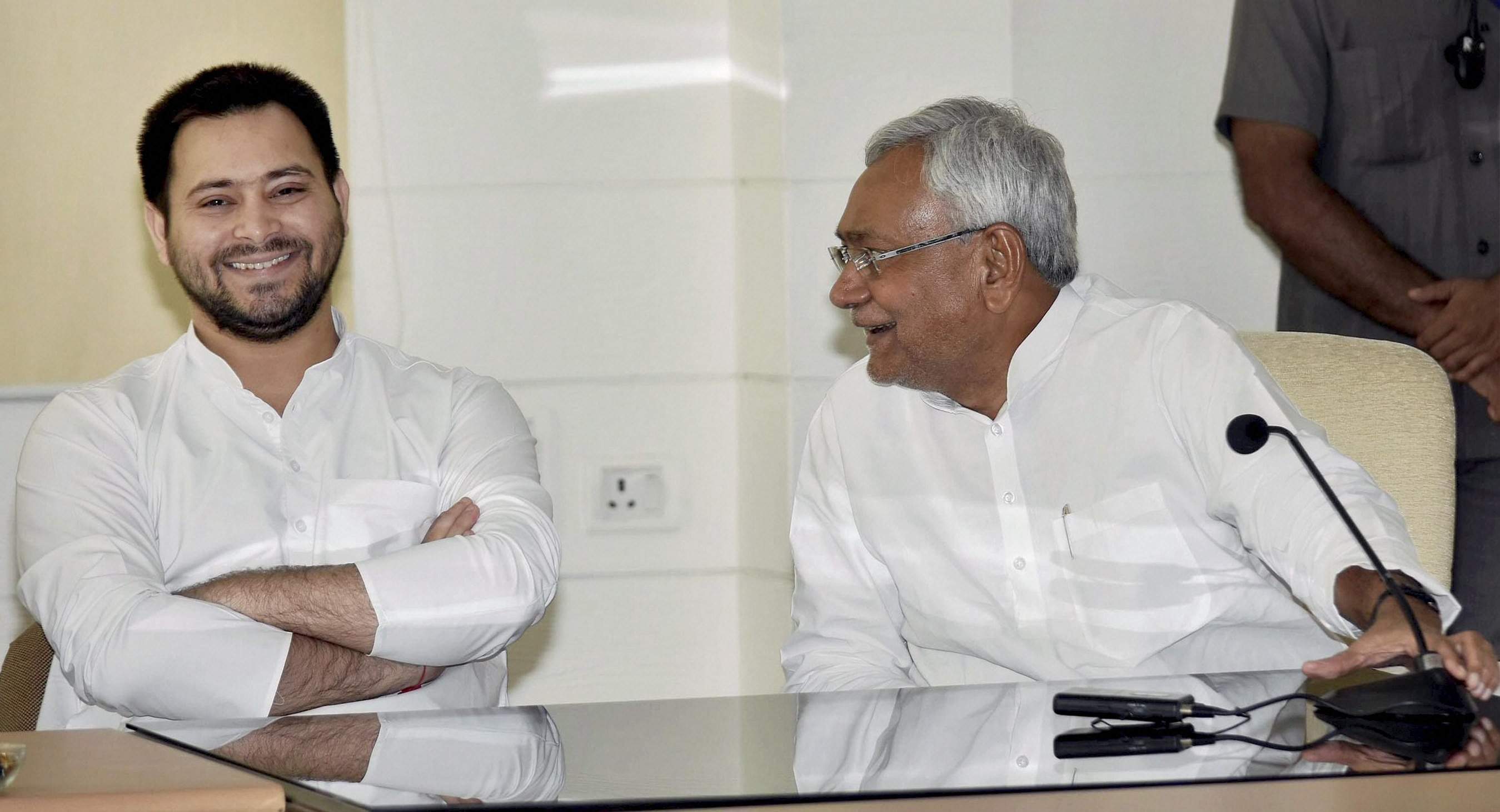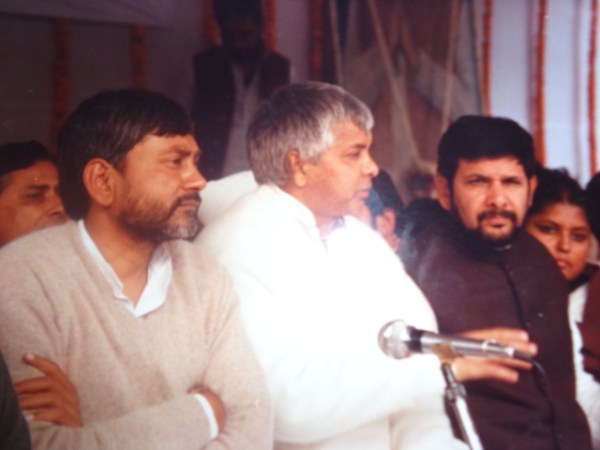The 21st day of June has always been special for Nitish Kumar. It was on 21 June 1994 that he broke away from the Janata Dal, giving a big jolt to Lalu Prasad Yadav. After warring for two decades, they joined hands in 2014. But within less than three years, on 21 June 2017, Nitish gave another jolt to Lalu by announcing his support for the presidential candidate of the National Democratic Alliance (NDA). The opposition parties were to meet on 22 June to pick their candidate. But Nitish pre-empted them. Neither did he himself attend the meeting nor did he send a representative.

At the Iftar party in Lalu’s residence on 23 June, both the leaders seemed ill at ease. Next day, there were reports that they had a discussion but nothing came out of it. Nitish stood his ground. Lalu, after attending the meeting of the opposition parties in New Delhi, announced that his crusade against the BJP would continue. Political analysts were perplexed by Nitish’s turnaround. The same Nitish, only a year ago, had given the slogan of “Sangh-Mukta Bharat”.
The politics of Bihar seems to be an enigma to many. It turned even more enigmatic when the CBI registered an FIR against Lalu Prasad, his wife and former chief minister Rabri Devi, and their son and deputy chief minister Tejashwi Prasad Yadav. Their CBI raided their residences. Tejashwi was questioned for several hours. This added fuel to the fire. The Grand Alliance was now in the ICU. Rumours spread thick and fast. Truth turned into falsehood in a jiffy and what seemed patently false yesterday, looked like an unimpeachable truth today. In fact, no one knew what was true, and what was false.

I had written earlier (Rashtriya Sahara, ‘Hastakshep’, 24 June) that the countdown for the end of the Grand Alliance had begun. But as to who was responsible for it, I had said that was a separate issue. But now, when the Grand Alliance is on the verge of a break-up, it would be pertinent to discuss how and why this happened and also who is the villain and who, the hero.
The first question that needs to be examined is why Lalu and Nitish parted ways in 1994. Both were products of Jayaprakash Narayan’s movement launched in 1974. Both were jailed in the Emergency. In 1977, Lalu was elected to the Lok Sabha from Chhapra but Nitish Kumar lost in the assembly polls that followed a few months later. He could enter the Vidhan Sabha only in 1985. In 1989, he was elected to the Lok Sabha and was appointed minister for state in government led by prime minister Vishwanath Pratap Singh Government. But Lalu was always ahead of Nitish. After the death of Karpoori Thakur, Lalu became the leader of opposition and in 1990, the chief minister of Bihar. Because of his active participation in the Mandal movement, Lalu emerged as a heavyweight leader of the Backwards and the Dalits – the shining star of Bihar’s politics, with no challengers around. It was in similar circumstances that the authoritarian streak of Indira Gandhi had come to the fore. The same happened with Lalu. He started drifting away from his colleagues and associates. In 1994, Nitish Kumar decided to chart a different course and after a long struggle managed to push Lalu to the margins of politics. He took the BJP’s help to do that. In 2013, he parted ways with the BJP and then the contingencies of real politik brought Lalu and Nitish together. The BJP had to bite the dust in the 2015 Vidhan Sabha elections, mainly due to this alliance. Out of the 243 seats, the Rashtriya Janata Dal-Janata Dal (United)-Congress alliance won 172. The number of RJD MLAs exceeded that of JD-U’s by nine. Yet, Nitish was chosen the legislative leader of the alliance and Tejashwi was made the deputy chief minister. Lalu’s other son (Tej Pratap) was also taken on board in the Cabinet.
The problems began here. The Grand Alliance had all along opposed the narrow, saffron nationalism and pro-rich policies of the BJP. But the lofty ideals peddled by the alliance soon lay in tatters thanks to Lalu’s love for his clan. Nitish had little choice. He lacked the numbers, and numbers are essential in a democratic system of governance. Nitish Kumar took over with the confidence that no hurdles would be placed in implementing the pre-decided agenda of the alliance. Tejashwi Yadav earned people’s appreciation. Nitish Kumar won the confidence of the people by implementing measures like the prohibition. Even Prime Minister Narendra Modi, his biggest political opponent, praised him. Amid all this, surfaced the issue of Lalu’s elder son, Tej Pratap, selling the soil from the construction site of his mall to a government agency under him. Then, one thing led to another. From soil, the focus shifted to the mall, then to the land for the mall, then to companies that owned it and finally to Lalu Yadav’s term as the minister for railways. Tejashwi Yadav is not wrong when he says that he was just 13-14 years old when these questionable deals were signed. Probably, he wants the protection of Juvenile Offenders Act! But there is a folk saying that goes like this: “Baade poot pita ke ghar mein” (A son is brought up in his father’s home). The implication is that if a son benefits from the good deeds of his father, he will also have to pay the price for his wrongful acts. It is Tejashwi’s honourable father who is responsible for his plight. This shows how a person can drive not only society but also his own family towards ruin.
What will Nitish Kumar do? Everyone is asking him this question. Long ago, Kung-Fu Tzu, who was the king’s minister, asked famous philosopher Lao Tse, “What should the king do?” The philosopher said, “The king should remain inactive”.
Nitish is indeed inactive in this matter. When the events were rapidly unfolding, he was rejuvenating his health at Vejwan in Rajgir. The issue has nothing to do with him. Yes, Tejashwi is his deputy in the council of ministers but the charges against him are personal. He held a meeting of his party in which he urged Tejashwi to go to the people, offer an explanation and protect the parameters of public morality. This is how a guardian would advise.

But given Lalu’s nature, it is unlikely that he would ask his son to maintain the high standards of moral propriety. It seems from his statements and actions that he will fight the BJP even while he is embroiled in corruption charges. Some people are patting his back for it. When even terrorists can find supporters and sympathizers, why won’t Lalu find some? But those who care even a bit for ideals will be forced to think that why this socialist – who shouted from the rooftops that he was an opponent of private capital – made his family pursue wealth. Had Jayaprakash Narayan and Karpoori Thakur taught him this? Lalu Prasad’s associates are asking whether those around Nitish and BJP are squeaky clean. Only the people concerned can answer the question but that does mean that the CBI’s charges are not entirely baseless. It is doubtful whether any alliance can survive such intense internecine battles.
What will become of Nitish Kumar? He has already put himself in an awkward position and embarrassed his political associates. The CBI tightening its noose around his deputy chief minister will add to his difficulties. Now, he has three alternatives. First, he can pressurize his ministerial colleague to resign and ensure that he does. This will give him the option of appointing someone else from the RJD in place of Tejashwi. The second option is to break the Grand Alliance and run the government with the support of the BJP – even if it is from the outside. The third option is that he resigns from his post.
The most likely course of action is the first one. But this will also not ensure the stability of the Grand Alliance. It has cracked beyond redemption.
Nitish Kumar has not had to suffer any damage. His public image is such that even the BJP has had to declare unconditional support for him again and again. He has problems within his party. JD-U may be a national party but it’s become home to lazy, short-sighted and sycophantic leaders. Unless he embarks upon something akin to the Kamraj Plan to remould his party, he won’t be able to face the challenges that will come his way in the future. He would have to remain content with a being party to the political imperialism of the BJP.
Forward Press also publishes books on Bahujan issues. Forward Press Books sheds light on the widespread problems as well as the finer aspects of Bahujan (Dalit, OBC, Adivasi, Nomadic, Pasmanda) society, literature, culture and politics. Next on the publication schedule is a book on Dr Ambedkar’s multifaceted personality. To book a copy in advance, contact The Marginalised Prakashan, IGNOU Road, Delhi. Mobile: +919968527911.
For more information on Forward Press Books, write to us: info@forwardmagazine.in





